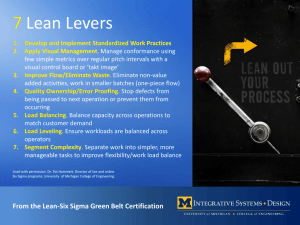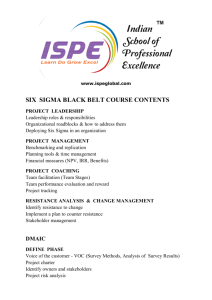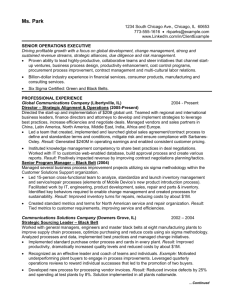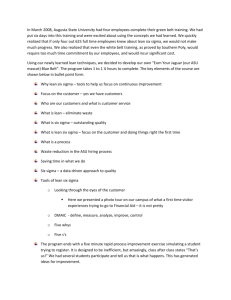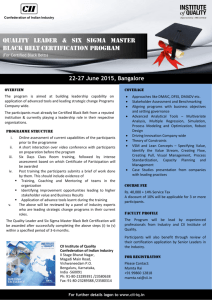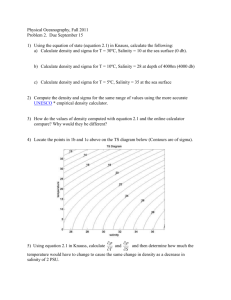Document
advertisement
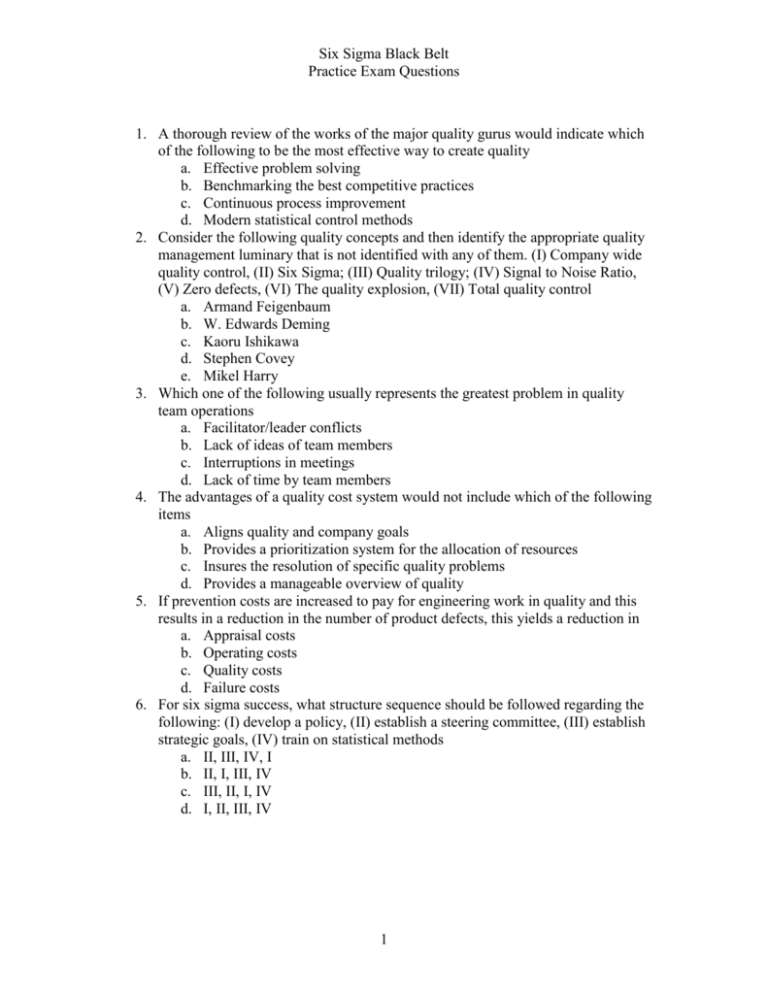
Six Sigma Black Belt Practice Exam Questions 1. A thorough review of the works of the major quality gurus would indicate which of the following to be the most effective way to create quality a. Effective problem solving b. Benchmarking the best competitive practices c. Continuous process improvement d. Modern statistical control methods 2. Consider the following quality concepts and then identify the appropriate quality management luminary that is not identified with any of them. (I) Company wide quality control, (II) Six Sigma; (III) Quality trilogy; (IV) Signal to Noise Ratio, (V) Zero defects, (VI) The quality explosion, (VII) Total quality control a. Armand Feigenbaum b. W. Edwards Deming c. Kaoru Ishikawa d. Stephen Covey e. Mikel Harry 3. Which one of the following usually represents the greatest problem in quality team operations a. Facilitator/leader conflicts b. Lack of ideas of team members c. Interruptions in meetings d. Lack of time by team members 4. The advantages of a quality cost system would not include which of the following items a. Aligns quality and company goals b. Provides a prioritization system for the allocation of resources c. Insures the resolution of specific quality problems d. Provides a manageable overview of quality 5. If prevention costs are increased to pay for engineering work in quality and this results in a reduction in the number of product defects, this yields a reduction in a. Appraisal costs b. Operating costs c. Quality costs d. Failure costs 6. For six sigma success, what structure sequence should be followed regarding the following: (I) develop a policy, (II) establish a steering committee, (III) establish strategic goals, (IV) train on statistical methods a. II, III, IV, I b. II, I, III, IV c. III, II, I, IV d. I, II, III, IV 1 Six Sigma Black Belt Practice Exam Questions 7. The greatest contribution of a reliability effort is made in the a. Design b. Manufacturing c. Shipping d. Field service 8. An operation requires shipments from your vendor of very small lots of fixed size. The attribute sampling plan used for receiving inspection should have its OC curve developed using which distribution a. Binomial b. Normal c. Poisson d. Hypergeometric 9. Two quantities which uniquely determine a single sampling attributes plan are a. AQL and LTPD b. Sample size and acceptance number c. AQL and producer’s risk d. LTPD and consumer’s risk 10. Under acceptance sampling, with screening, average outgoing quality will not be worse, in the long run, than the a. ATI b. AQL c. AOQL d. AOQ 11. Considerations to be made prior to the use of any sampling plan include (I) consumer and producer risks must be specified, (II) method of selecting samples must be specified, (III) characteristics to be inspected must be specified a. I only b. I and II only c. I and III only d. I, II, and III 12. The steeper the OC curve, the a. Less protection for both producer and consumer b. More protection for consumer and less for producer c. The lower the AQL d. The smaller the sample size 2 Six Sigma Black Belt Practice Exam Questions 13. In the failure rate model shown below, the part of the curve identified as “A” represents B A C a. The bath tub curve b. Random Poisson failures c. The burn in failure period d. Wear out failure 14. If two components having equal reliabilities of .92 were added in parallel with a component of .6585 reliability in series what would the resultant system reliability be? a. .9941 b. .6543 c. .6818 d. .7121 15. If the mean time between failures has been found to be 13 hours for a given component, what is the reliability at t = 13.2 hours? a. .920 b. .206 c. .362 d. .985 16. Two disadvantages of a fishbone diagram are (I) it displays causes in a nongraphical manner, (II) it takes time to perform and prioritize, (III) It presents the problem graphically, (IV) It does not develop an action plan a. I and III only b. I and II only c. II and IV only d. I and IV only 17. What other problem solving tool is customarily used to complement the fishbone diagram? a. Scatter diagram b. Pareto diagram c. Brainstorming d. FFA 18. Scatter diagrams are useful in problem solving because they a. Display the significant few b. Eliminate the trivial many c. Show relationships between variables d. Highlight special causes 3 Six Sigma Black Belt Practice Exam Questions 19. Basic information about data, such as central location, width, spread, and shape can be visualized using which tool a. p chart b. Affinity diagram c. Relationship diagram d. Histogram 20. If the probability of a car starting on a cold morning is .6 and we have two such cars, what is the probability of at least one of the cars starting on a cold morning? a. .84 b. .81 c. .60 d. .36 21. For the normal probability distribution, the relationships among the median, mean, and mode are that a. They are all equal to the same value b. The mean and mode have the same value but the median is different c. Each has a value different from the other two d. The mean and the median are the same but the mode is different μ x e -μ 22. The expression P(x) refers to the x! a. Poisson distribution b. Pascal distribution c. Beta distribution d. Binomial distribution 23. The average number of flaws in large plate glass is .25 per pane. The standard deviation of this Poisson distribution is a. .25 b. .05 c. .75 d. .50 24. You have been asked to sample a lot of 300 units from a vendor whose past quality has been about 2% defective. A sample of 40 pieces is drawn from the lot and you have been told to reject the lot if you find two or more parts defective. What is the probability of finding two or more parts defective? a. .953 b. .809 c. .191 d. .047 25. A process which is in statistical control will (I) produce product to specifications, (II) consistently produce product which, when charted, will fall within statistical control limits, (III) results in a Cpk value of 1.0 or better. a. I only b. II only c. II and III only d. I, II, and III 4 Six Sigma Black Belt Practice Exam Questions 26. An xbar and R chart was prepared for an operation using 20 samples with 5 pieces in each sample. x was found to be 33.6 and R was 6.2. During production a sample of 5 was taken and the pieces measured 36, 43, 37, 25, and 38. At the time this sample was taken a. Both the average and range were within the control limits b. Neither the average nor range were within the control limits c. Only the average was outside the control limits d. Only the range was outside the control limits 27. A process is checked by inspection of random samples of four shafts after a polishing operation and xbar and R charts are maintained. A person making a spot check picks out two shafts, measures them accurately, and plots the value of each on the xbar chart. Both points fall just outside the control limits. He advises the department supervisor to stop the process. This decision indicates that a. The average is out of control b. Both the average and range charts are out of control c. The range is out of control d. The person is not using the chart correctly 28. In a normal distribution what is the area under the curve between +.7 and +1.3 standard deviation units? a. .2903 b. .7580 c. .2580 d. .1452 29. Given x 51.0 and R 4.0 with n 5 and assuming statistical control, what proportion of the population will meet specs of 50 + 3? a. .87 b. .81 c. .91 d. .93 30. The process has been performing satisfactorily for some time. An improvement is required. Your response is to a. Direct the workforce to be more careful in their work b. Issue a slogan “DMAIIC” c. Identify the special causes to correct the process d. Identify the common causes to correct the process 31. The results of a designed experiment are to be analyzed using a chi square test. There are five treatments under consideration and each treatment falls under two categories (success or failure). The calculated value of chi-square is compared to the tabulated value with how many degrees of freedom? a. 10 b. 9 c. 5 d. 4 5 Six Sigma Black Belt Practice Exam Questions 32. Ratios of two variances drawn from the same normal population are described by which of the following distributions? a. F b. Student t c. Chi-square d. Normal 33. If the 95% confidence limits for the turns out to be 6.5 and 8.5 it means a. The probability is .95 that x falls between 6.5 and 8.5 b. The probability is that x falls between 6.5 and 8.5 c. The probability is .95 that the interval contains . d. 4 =8.5-6.5 34. Determine whether the following two samples have significantly different variances at the 5% level: Sample A has 2 1347 based on a sample size of 61 and sample B has 2 of 2237 based on a sample of 31. a. Significant difference because Ftest<Ftable b. No significant difference because Ftest< Ftable c. Significant difference because Ftest > Ftable d. No significant difference because Ftest > Ftable 35. When finding a confidence interval for mean based on a sample size of n a. Increasing n increases the interval b. Having to use Sx instead of n decreases the interval c. The larger the interval the better the estimate of d. Increasing n decreases the interval 36. If a sample size of 16 yields an average of 12 and a standard deviation of 3, estimate the 95% CI for the mean a. 10.4, 13.6 b. 10.45, 13.55 c. 10.53, 13.47 d. 10.77, 13.23 37. An experiment with two factors, in which all levels of one variable are run at each level of the second variable is called a a. One way experiment b. Latin square experiment c. Factorial experiment d. Fractional factorial experiment 38. A 32 experiment means that we are considering a. Two levels of three factors b. Two dependent variables and three independent variables c. Two go/no go variables and three continuous variables d. Three levels of two factors 6 Six Sigma Black Belt Practice Exam Questions 39. When constructing a factorial experiment which of the following is true a. Factorial experiments may not contain any number of levels per factor. They must be the same for each factor b. Confounding takes place in factorials when we run a fractional part of the complete experiment c. Contrasts and treatment combinations are the same d. In factorials, the factors must be quantitative 40. A two way ANOVA has r levels for one variable and c levels for a second with 2 observations per cell. The degree of freedom for interaction is a. 2rc b. (r-1)(c-1) c. rc-1 d. 2(r-1)(c-1) 41. Consider the SS and MS columns of an ANOVA table for a single factor design. The appropriate ratio for testing the null hypothesis of no treatment effect is a. SS treatments divided by SS residual b. MS treatments divided by MS residual c. SS treatments divided by MS residual d. MS treatments divided by SS residual 42. A study was conducted on the relationship between the speed of different cars and their mileage. The correlation coefficient was found to be .35. Later it was discovered that there was a defect in the speedometers and they had all been set 5 miles per hour too fast. The correlation coefficient was computed using the corrected scores. Its new value will be a. .30 b. .35 c. .40 d. -.35 43. The objective of six sigma is to a. Increase variability b. Reduce variability c. Decrease customer satisfaction d. Hit the customer’s target e. Both b and d above 44. Which of the following is not part of Deming’s Theory of profound knowledge? a. Knowledge of processes b. Knowledge of statistics and variation c. Knowledge of psychology or motivation d. Knowledge of general systems theory 45. Champions are expected to do all of the following except a. Lead teams b. Provide support c. Provide resources d. Remove barriers e. Prevent scope creep 7 Six Sigma Black Belt Practice Exam Questions Answers Question Answer Question Answer 1 2 3 4 5 6 7 c d a c d b a 24 25 26 27 28 29 30 c b d d d a d 8 9 10 11 12 13 14 15 16 c b c d b c b c c 31 32 33 34 35 36 37 38 39 d a c c d a c d b 17 18 19 20 21 22 23 c c d a a a d 40 41 42 43 44 45 b b b e d a 8

